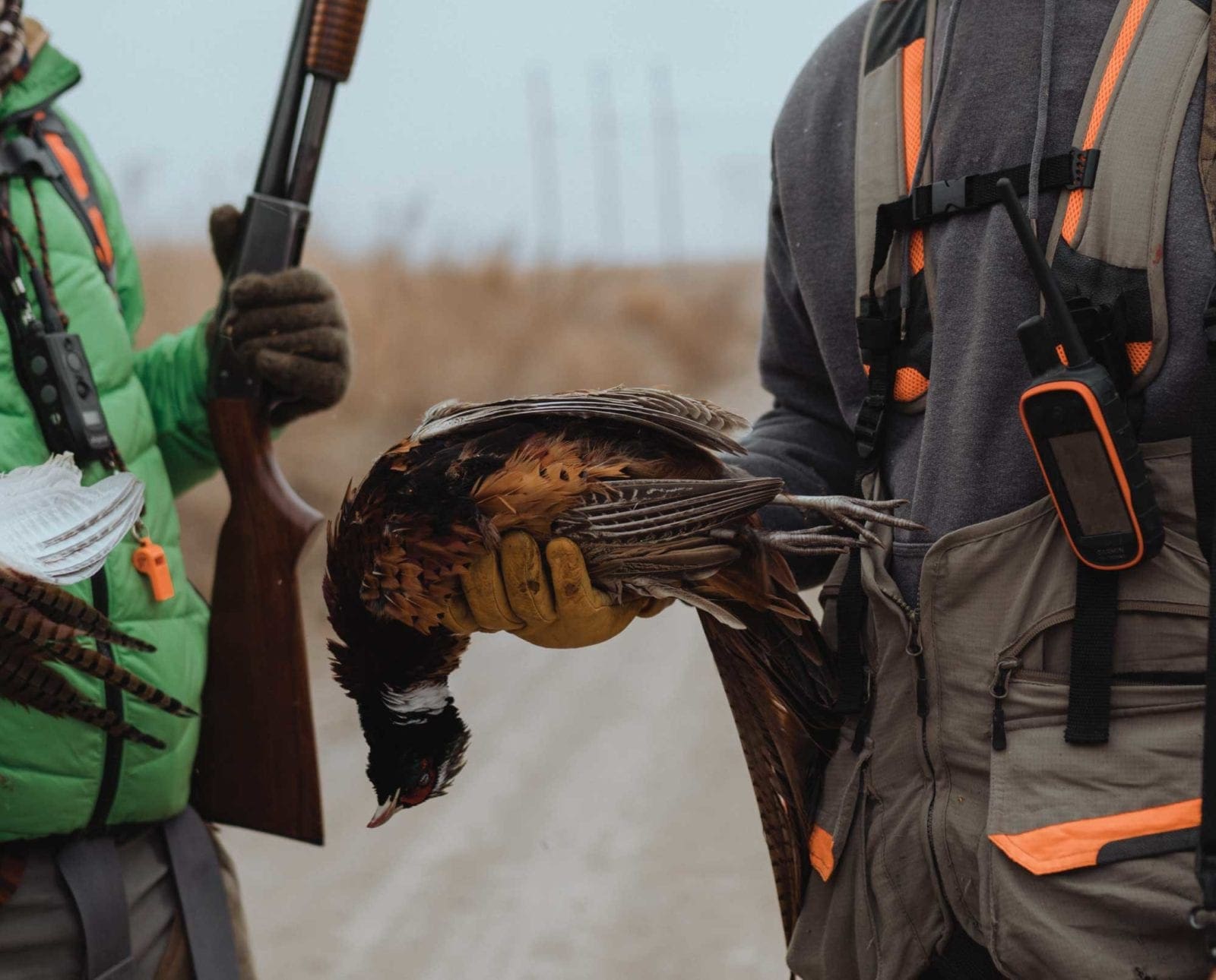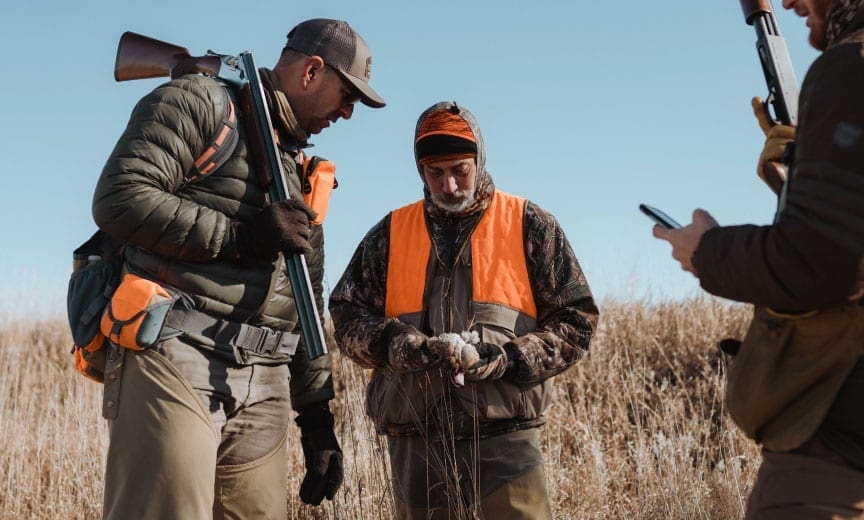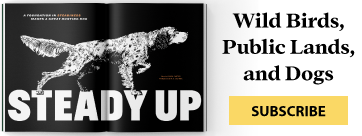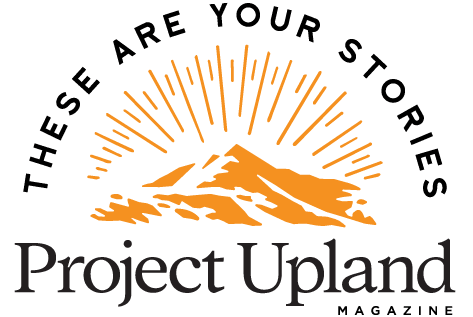Home » Hunting Culture » Mentoring Hunters in the 21st Century of Technology and Ideas
Mentoring Hunters in the 21st Century of Technology and Ideas

Jennifer Wapenski is the Director of Operations and Managing Partner…
Take a look at opportunities for mentoring hunters and how they have evolved in a modern era
“How do you guys want to approach this property?” The question was posed at our last stop of the day, mostly to be polite but likely a bit of a quiz, too. It had been a long day of enduring frigid temperatures and a piercing wind, but we were honing our new skill of identifying late-season pheasant habitat.
This particular property was primarily rangeland with rolling hills of grass and drifted snow. A wide drainage cut through the middle, containing a small stream and punctuated with the occasional cottonwood. It looked like great pheasant habitat and my instinct said to jump out of the truck and make the most of the last couple hours of daylight. I fought this urge in favor of making a strategic plan, which has been my latest goal as a developing bird hunter. Reflecting on the earlier parts of the day, I remembered the birds running away and flushing in large groups, well out of range and nearly out of sight. These January roosters were clearly spooked; continuing to try the same approach over and over again just wasn’t working.
“Maybe we should split up and walk this drainage from opposite ends to try to contain the runners?” I offered.
Our friend smiled and nodded his agreement. “Exactly what I was going to suggest!”
A short while later, my opportunity came. A rooster had been running from our oncoming friend and flushed in surprise upon realizing he was trapped. I made the most of my shot and my dog executed a flawless track and retrieve. Within moments, I had my very first wild Washington rooster, thanks in no small part to our friend and mentor.
Mentoring takes many forms
Declining hunter numbers and R3 campaigns are all the buzz in hunting media right now, and most agree that mentoring is a crucial part of attracting and developing new hunters. (Read: What is R3 in Hunting?) However, mentoring relationships do not have to follow the same format in order to be successful. We tend to assume that mentoring someone requires a huge time commitment over a long stretch of time. While this kind of investment certainly pays off, there are other approaches to mentoring that can have just as significant an impact.
The traditional ‘tag along’ approach
Inviting a new or prospective hunter along on a hunt is certainly the best way to introduce someone to their very first hunting experience. It takes away many of the entry barriers because the mentor is demonstrating where to go, how to do it, and perhaps even lending some critical gear. The time spent together in the field offers opportunities for discussion of important topics like gun safety, habitat identification, the etiquette of hunting with someone else’s dog, and hunting ethics.
This method works particularly well with youth hunters who may not have the means or ability to get out and spend a day afield on their own. It often works best as an ongoing relationship with frequent outings in order to keep the interest level strong. For those who have the time and means to invest in this type of relationship, it can have a lasting impact on both the mentor and the mentored.
Connecting virtually through social media
The impact of social media on forging connections with other hunters cannot be understated. We are fortunate to be able to discover and communicate with other hunters across the world or within the same state. Experienced hunters can take advantage of this opportunity to educate and mentor newer hunters by connecting virtually and offering their advice and knowledge.

For this to work, the new hunter must be self-motivated and hungry to learn. Fortunately, there are many of us out there! The number of adult-onset hunters continues to rise, which means there’s a growing population of people eager to learn how to become better hunters.
Project Upland has created an opportunity for this type of relationship to develop via the Project Upland Community Facebook Group. Community members can sign up as mentors or students and select a match that fits with their hunting style and goals. Whether this results in an actual meet-up or remains virtual, the opportunity is there to forge a relationship and help someone take the next step along their hunting journey.
A hybrid approach
A mentoring relationship doesn’t have to fit squarely in any one category. Depending upon the situation, the relationship can take many different forms. What matters is that there is a meaningful connection and an exchange of knowledge and expertise; ideally it also lasts over time, though there are plenty of instances where a single experience had a lasting effect on someone.
My husband and I were fortunate to gain a mentor when someone reached out through social media after reading my articles about starting out as a rookie hunter. We meet just once a year to hunt together, but in between those visits, he is generous with his knowledge and information. He asks, “What species are you targeting this time?” and makes suggestions about new areas to check out. Our annual hunts have taught us all about identifying suitable habitat, which allows us to be much more effective the next time we’re out on our own. His mentoring has led to many “firsts” – first chukar, first shot at a hun (I will get one eventually!) and my first wild rooster in my home state. His investment of one day a year plus the willingness to share openly has made a lasting difference in our hunting journey.
Rules of engagement
As a mentor, don’t be afraid of setting clear rules and expectations. A new hunter may not understand the etiquette around hunting someone else’s covers. If you want to help them on their journey but not totally sacrifice your sacred spots, it’s okay to make that clear. Explain that you’re showing them a special place that took you years to discover, and that you’d prefer if they take their newfound knowledge to discover their own special places with their own personal significance.
Do not compromise on the issue of safety, though. It’s best not to assume that the new hunter is always aware of their actions and how they can affect others. Bringing a dog into the equation only complicates this issue, so be explicit in stating your expectations. If in doubt, invite the new hunter to tag along without a gun until safe protocols can be established. The consequences of being unsafe can be permanent, so there should be no room for negotiation here.
A promising future
With enough mentors willing to invest in mentoring relationships, we can hope to fight the decline and see hunter numbers increase over the coming years. Is there someone in your dog training group who is interested in hunting but doesn’t have anyone to go with? Do you have a friend who is passionate about eating sustainably who might consider hunting small game? There are countless opportunities out there, especially for those willing to think outside the box. Small game and bird hunting are relatively easy entry points into hunting, as long as the new hunter can make meaningful connections with others willing to help along the way.
SUBSCRIBE to the AUDIO VERSION brought to us by: ESP – Digital Hearing Protection for FREE : Google | Apple | Spotify
Jennifer Wapenski is the Director of Operations and Managing Partner at Project Upland Media Group. She has a lifelong passion for the outdoors, dogs, and wildlife; as an adult, she discovered that upland bird and waterfowl hunting were natural extensions of these interests. What started as initial curiosity soon escalated into a life-changing pursuit of conservation, advocacy, and education. Jennifer serves in a variety of roles such as the Breed Warden for the Deutsch Langhaar—Gruppe Nordamerika breed club, on the board of the Minority Outdoor Alliance, and on an advisory committee for the Washington Department of Fish and Wildlife.




